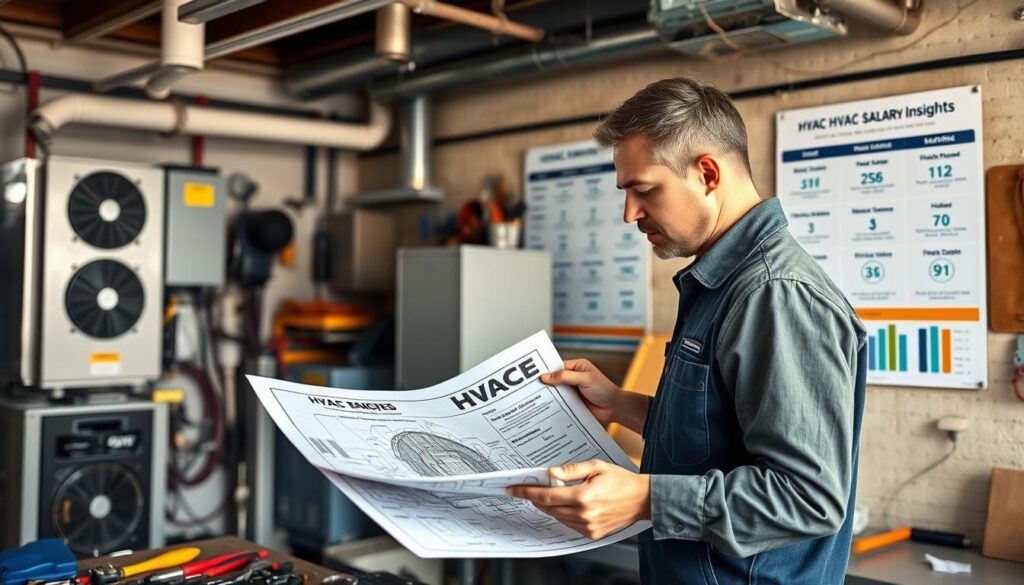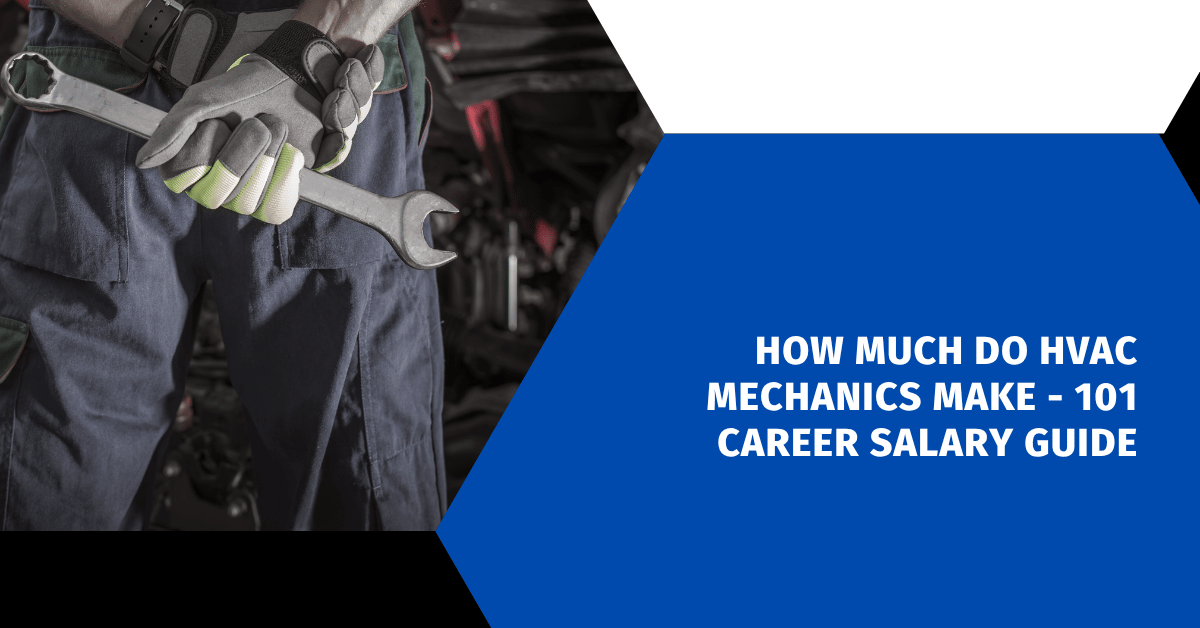Affiliate Disclosure
HVAC Guide Guys is a participant in the Amazon Services LLC Associates Program, an affiliate advertising program designed to provide a means for sites to earn advertising fees by advertising and linking to Amazon.
How Much Do HVAC Mechanics Make? Ever wondered how much HVAC mechanics earn? They keep our homes and businesses comfy. Let’s explore their earnings in today’s job market.

The HVAC technician salary scene is full of chances for skilled workers. The Bureau of Labor Statistics says the median annual wage is $57,300. This makes HVAC a promising career for those in technical trades.
Starting a career in HVAC can be stable and rewarding. This guide will cover HVAC mechanic salaries. We’ll look at entry-level to advanced roles, across states and specializations.
Key Takeaways
- Median HVAC technician salary is $57,300 per year
- Earning varies by experience and location
- Technical skills and certifications matter
- The industry is growing with more jobs
- There’s room for career growth
Table of Contents
Understanding HVAC Technician Career Path
Starting an HVAC technician career is exciting. It’s a field that’s growing and full of opportunities. You’ll learn about the professional world and the paths you can take in this important industry.
Entry-Level Requirements and Education
To begin in HVAC, you need certain education and training. Employers usually look for these qualifications:
- High school diploma or equivalent
- Technical school certification in HVAC systems
- Vocational training program completion
- Apprenticeship experience
At the start, HVAC installers make between $35,000 and $45,000 a year. Investing in your education can really boost your earnings and career.
Career Progression Stages
Your HVAC career can grow in several stages. Each stage brings more responsibility and better pay:
- Apprentice Technician: Learning the basics
- Junior Technician: Doing installations on your own
- Senior Technician: Handling complex systems
- Supervisor/Management: Leading teams
Industry Growth and Opportunities
The HVAC industry is expected to grow a lot, according to the Bureau of Labor Statistics. This means more job security and chances to move up. You can also specialize in areas like commercial HVAC or smart home tech to improve your career.
Always keep learning and growing in your HVAC career to reach your full potentials.
National Average HVAC Technician Salary Overview
Understanding hvac engineer earnings is key for those thinking about a career in heating and cooling. The national scene for heating and cooling technician wages is full of chances across the United States.
As of May 2023, HVAC mechanics make a median of $57,300 a year. This means they earn $27.55 an hour. It’s a good career for skilled people. Your pay can change a lot based on a few important things.
- Entry-level jobs start around $37,000 a year
- More experienced technicians can make up to $84,000 yearly
- Specialized HVAC engineers might earn even more
Your salary in the HVAC world depends on many things. Experience, where you work, certifications, and what you specialize in are all important. Places with high demand and extreme weather often pay more to HVAC experts.
The HVAC industry offers stable and well-paying jobs for those who want to grow their technical skills.
When looking at heating and cooling technician wages, remember that learning and specializing can really increase your earnings. Getting advanced certifications and keeping up with new tech can make you stand out in this fast-changing field.
Explore Our HVAC Shop
Looking for top-rated HVAC tools, parts, and accessories? Visit our shop and find the perfect solution for your needs.
Visit the ShopExperience-Based Salary Breakdown
Your earnings as an HVAC technician grow with experience. Knowing how pay changes can help plan your career and income goals.
As you grow in the HVAC field, your pay increases. Your skills, knowledge, and experience all play a role in your earnings.
Entry-Level HVAC Technician Salary
Starting out, you can earn about $54,100 a year. This is for your first 0-2 years in the field.
- Hourly rate: Around $22-$25
- Annual salary range: $45,760 – $54,100
- Key focus: Learning basic skills
Intermediate HVAC Technician Salary
With 2-4 years of experience, your pay jumps. Intermediate technicians make about $65,700 a year.
- Hourly rate: Around $26-$30
- Annual salary range: $55,000 – $65,700
- Key focus: Developing specialized skills
Senior Level HVAC Technician Salary
At 4-7 years of experience, you become a senior technician. Your income can hit up to $77,200 a year.
| Experience Level | Annual Salary | Hourly Rate |
|---|---|---|
| Entry-Level (0-2 years) | $54,100 | $22-$25 |
| Intermediate (2-4 years) | $65,700 | $26-$30 |
| Senior Level (4-7 years) | $77,200 | $32-$37 |
Tip: Keep learning, get certifications, and specialize to boost your salary in HVAC.
How Much Do HVAC Mechanics Make in Different States
Exploring how much HVAC mechanics make shows big salary differences across states. Your pay can change a lot based on where you live.
Some states pay HVAC mechanics more than others. Places like Colorado, Connecticut, and Maryland often pay above the national average. These areas have a high demand for skilled HVAC workers.
- Top-paying states for HVAC mechanics:
- Colorado: Highest average salaries
- Connecticut: Competitive compensation packages
- Maryland: Strong market demand
- Factors influencing regional salary differences:
- Local economic conditions
- Cost of living
- Industrial infrastructure
Rural areas typically offer lower salaries, but they often have lower living costs. This means you might have the same buying power as in higher-paying areas.
“Location can be a game-changer in your HVAC career earnings.” – HVAC Industry Insights
Knowing how salaries vary by state is key for career planning. Whether you’re thinking about moving or planning your career, understanding these trends is vital. It helps you make the most of your HVAC career.
Explore Our HVAC Shop
Looking for top-rated HVAC tools, parts, and accessories? Visit our shop and find the perfect solution for your needs.
Visit the ShopTop-Paying Cities for HVAC Technicians
Location is key when thinking about a career as an HVAC technician. Some cities pay more for skilled workers in heating, ventilation, and air conditioning.
The best cities for HVAC installers offer high incomes. These cities have strong markets, high living costs, and complex industries. Let’s look at the top places for HVAC pros to earn more.
San Francisco: Peak Earning
San Francisco is the top spot for HVAC techs, with an average salary of $64,200. The city’s tech industry and complex buildings mean a big demand for HVAC experts.
New York City: Urban HVAC Opportunities
New York City is great for HVAC installers, with an average salary of $60,600. The city’s busy streets and many buildings always need skilled HVAC techs.
Seattle: Technology Hub
Seattle is the third best, with a salary of $59,200. The city’s growing tech scene and new buildings make it a good place for HVAC pros.
| City | Average HVAC Salary | Key Market Characteristics |
|---|---|---|
| San Francisco | $64,200 | Tech industry, complex infrastructure |
| New York City | $60,600 | Dense urban environment, commercial buildings |
| Seattle | $59,200 | Technology hub, innovative design |
Choosing where to work can really affect your income as an HVAC installer. Think about these cities for better pay.
Factors Affecting HVAC Technician Salaries

Your earnings as an HVAC technician depend on several key factors. Knowing these can help you plan your career and increase your pay.
Experience is a big factor in your salary. The more you work, the more you earn. Employers value the skills and knowledge of experienced technicians.
- Years of practical experience
- Specialized technical skills
- Geographic location
- Professional certifications
- Employer type and size
Different areas in HVAC can change how much you make. Those working on big commercial systems or industrial cooling often earn more than those fixing homes.
| Specialization | Average Annual Salary | Potential Growth |
|---|---|---|
| Residential Services | $55,000 | Moderate |
| Commercial Systems | $68,500 | High |
| Industrial Refrigeration | $75,200 | Very High |
Building your professional network and getting more training can also help. So can getting advanced certifications.
Explore Our HVAC Shop
Looking for top-rated HVAC tools, parts, and accessories? Visit our shop and find the perfect solution for your needs.
Visit the ShopCommercial vs Residential HVAC Pay Differences
When looking at heating and cooling technician wages, it’s key to know the difference between commercial and residential HVAC. Each area has its own opportunities and challenges that affect how much you can earn.
The HVAC field offers many career paths with different pay levels. Choosing between commercial and residential work can greatly affect your future earnings.
Commercial Sector Benefits
Commercial HVAC techs often make more money because of the complex systems they work with. They handle advanced equipment in big places like:
- Office complexes
- Industrial facilities
- Hospital systems
- Educational institutions
Residential Market Opportunities
Residential HVAC work means steady jobs and building good relationships with customers. It might not pay as much, but it offers:
- Steady workflow
- Predictable scheduling
- Direct client interactions
- Potential for repeat business
Specialization Impact on Earnings
Your skills can really change how much you earn. Being good at green technology, advanced refrigeration, or energy-efficient systems can increase your pay a lot.
“Skill diversity is your greatest asset in the HVAC industry.” – Professional HVAC Association
By picking the right career path and keeping your skills sharp, you can earn more in this fast-changing field.
Essential Certifications for Higher Pay
Getting higher pay as a commercial hvac technician starts with the right certifications. These credentials can boost your salary and open new career paths.
Certifications show you’re an expert in HVAC. They prove your skills and make you more appealing to employers.
- EPA 608 Certification: Required for handling refrigerants
- NATE (North American Technician Excellence) Certification: Industry-recognized credential
- HVAC Performance Verifier: Specialized technical qualification
- Ground Source Heat Pump Loop Installer: Advanced specialization
“Certifications are your ticket to higher earnings and professional recognition in the HVAC industry.” – HVAC Industry Expert
Getting these certifications takes hard work and continuous learning. You’ll need to finish training, pass tough exams, and keep learning to keep your certifications.
| Certification | Average Salary Increase | Difficulty Level |
|---|---|---|
| EPA 608 | 5-8% | Moderate |
| NATE Certification | 10-15% | High |
| Heat Pump Specialist | 12-18% | Advanced |
Investing in your professional development through targeted certifications can dramatically increase your earning in the HVAC industry.
Explore Our HVAC Shop
Looking for top-rated HVAC tools, parts, and accessories? Visit our shop and find the perfect solution for your needs.
Visit the ShopBenefits and Compensation Packages
Looking at how much HVAC mechanics make, it’s important to see more than just the base salary. The total package includes benefits that boost your earnings and job happiness.

HVAC workers get a great benefits package. It’s more than just a paycheck. These packages help attract and keep skilled technicians in a tough job market.
Health Insurance and Retirement Planning
Employers usually offer strong health coverage for HVAC techs. This includes:
- Medical insurance with full coverage
- Dental and vision plans
- 401(k) retirement savings options
- Life insurance protection
Performance-Based Financial Incentives
Many companies give bonuses to boost your salary. These can be:
- Quarterly performance rewards
- Customer satisfaction bonuses
- Project completion incentives
- Safety achievement recognition
Additional Career Perks
Some employers offer special perks. These include:
- Tuition reimbursement for professional certifications
- Tool allowances
- Company vehicle usage
- Continuing education opportunities
When looking at job offers, think about the whole package. A good benefits plan can really up your earnings in the HVAC field.
Career Growth and Advanced Opportunities
Starting as an HVAC technician opens doors to more than just entry-level jobs. The HVAC world has many ways to grow your career and boost your income. Your skills and experience can lead to exciting new opportunities.
There are several paths to climb in the HVAC field:
- Lead Technician: Supervise team operations and mentor junior technicians
- Service Manager: Oversee entire service departments and coordinate complex projects
- Operations Manager: Manage multiple teams and strategic business functions
- Business Owner: Launch your own HVAC service company
Getting better at specific skills can also raise your pay. Focus on areas like:
- Energy-efficient systems
- Smart home technologies
- Industrial HVAC solutions
- Building automation systems
| Career Stage | Potential Roles | Average Income Increase |
|---|---|---|
| Entry Level | Technician | Base Rate |
| Mid-Career | Lead Technician | 15-25% Increase |
| Advanced | Service Manager | 30-40% Increase |
| Expert | Business Owner | 50-100% Possible Increase |
Keep learning and improving your skills to reach your career goals. Get more certifications, keep up with new tech, and network. This will help you grow in your career.
Explore Our HVAC Shop
Looking for top-rated HVAC tools, parts, and accessories? Visit our shop and find the perfect solution for your needs.
Visit the ShopIndustry Trends Affecting HVAC Salaries
The HVAC industry is changing fast, affecting how much heating and cooling technicians make. New tech and stricter environmental rules are changing job options for HVAC engineers.
There are exciting changes in the field:
- Smart HVAC systems are changing how we use technology.
- Sustainable buildings need special skills, boosting demand.
- Energy-saving tech is opening up new job areas.
Climate change and tighter energy rules are making HVAC jobs more valuable. Those skilled in green tech and advanced systems can earn more.
The Bureau of Labor Statistics sees big growth in HVAC jobs. An aging workforce and more building projects mean good chances for skilled workers.
Staying up-to-date and learning new things is key to earning more in HVAC.
New areas like renewable energy and smart homes are raising salaries. Keeping up with new tech will help your future earnings in the heating and cooling field.
Conclusion
The HVAC industry is full of chances for skilled workers looking for stable jobs. Your earnings as an HVAC contractor can change a lot. This depends on your experience, what you specialize in, and where you work.
Commercial HVAC technician income has a lot of room to grow. Top earners make good money in different markets.
Getting better at your job means always learning and getting new certifications. Investing in your skills can really boost your value. This is true, even more so in areas like commercial HVAC systems.
Knowing about salary trends and what’s in demand can help you find great jobs. This field is key and always needs skilled people.
Your success in HVAC depends on hard work, knowing your stuff, and being able to adapt. Whether you’re just starting or aiming for the top, keep learning and growing. The HVAC world is bright, with lots of jobs and good pay.
Remember, your pay isn’t just about your salary. Bonuses, benefits, and chances to move up can add a lot to what you earn. Being the best you can be will help you reach your full career goals in this exciting field.

